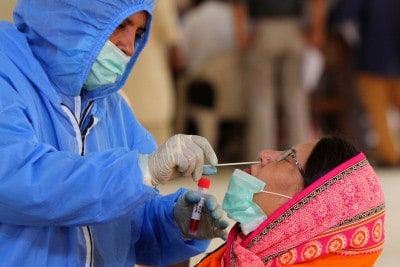Islamabad, Nov 15 : After successfully flattening the Covid-19 curve earlier this year, Pakistan has recently witnessed a resurgence of confirmed cases and the country is now preparing and galvanizing its efforts to control a second wave of the pandemic.
As of Sunday, Pakistan’s overall coronavirus caseload and death toll stood at 354,461 and 7,109, respectively, reports Xinhua news agency.
Health officials in the country have said that the second wave has alreadystarted in Pakistan, urging citizens to take extra precautions to counter it.
The National Command and Operation Center of Pakistan, which oversees the country’s coronavirus response, recently made it mandatory for citizens to wear masks at public places.
Giving exemption to pharmacies, hospitals and clinics, the center has also ordered reduction in timings for markets and commercial activities to contain the virus.
However, authorities are yet to make a decision regarding closure of educational institutions, and said that the government may close schools, colleges and universities across the country if the coronavirus spread continues to increase in the coming days.
As the country has been battling the second wav, Pakistani experts and health officials believe that the country has a lot to learn from its previous experience of handling the pandemic.
Speakng to Xinhua, Secretary General of the Pakistan Medical Association Qaiser Sajjad, said that even when there was not a single coronavirus case, Pakistan had ramped up efforts to effectively monitor air and land borders which greatly helped in slow arrival and spread of the virus in the country.
Executive Director of Pakistan Institute of Medical Sciences Ansar Maqsood said that though the situation was not that distressing yet, it is crucial for the people to strictly abide by the SOPs in view of the increasing number of patients each passing day.
“Simply following very basic preventive measures of wearing a mask, washing hands, and maintaining a required social distance can prevent the spread of epidemic up to 90 per cent,” he told Xinhua.
“People took false impressions of the initial success as they think that the deadly virus has vanished and therefore, precautionary measures are being ignored recently. Furthermore, the new cases of the coronavirus are being considered as seasonal flu caused by the dry weather and dusty air,” Maqsood said.
If citizens continue to display care-free behavior, it can lead to a dramatic loss of human life and present an unprecedented challenge to public health, and economic and social disruption, he said.
Maqsood warned that though Pakistan was able to suppress the first wave, the second wave could be more deadly than the first one.
Disclaimer: This story is auto-generated from IANS service.

